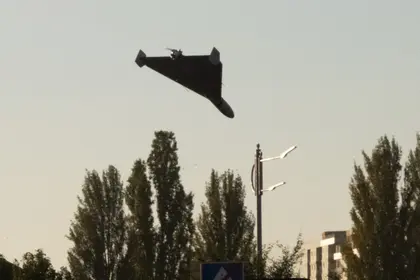Deployed on a scale never seen before to carry out both surveillance and strikes, drones ranging from small commercially-available models to larger aircraft have become a defining feature of the Ukraine conflict.
JOIN US ON TELEGRAM
Follow our coverage of the war on the @Kyivpost_official.
Drones have been a part of warfare for years, employed extensively by the United States during the “War on Terror,” and they have played important roles in conflicts including in Iraq and in the Nagorno-Karabakh region.
But the degree to which they are being used by both sides in Ukraine -- and the benefits they bring, as well as the threats they pose -- highlights the importance for militaries to be ready to employ and to counter drones in future conflicts.
“The size and the scale of drone use in Ukraine supersedes all the previous conflicts,” said Samuel Bendett, a researcher in uncrewed military systems who is an analyst with the CNA Russia Studies Program.
Bendett stressed the “absolutely unprecedented use of commercial-type drones” for both surveillance and combat in Ukraine, and said the war has shown that “small... tactical drones are absolutely essential -- at every unit, every platoon level, every company level.”
“Because these are basically expendable with a very short shelf life, they have to be provided to the forces in very large quantities,” he said.
- ‘Accessible and cheap’ -

Trump Makes 90 Day Foreign Aid Freeze – Ukraine Military Support Supposedly Untouched
Drones have played key roles from the earliest days of the conflict, with Ukrainian forces using Turkish-made Bayraktars to carry out strikes on Moscow’s troops as they unsuccessfully sought to seize Kyiv.
Both sides are using drones to locate and track enemy forces as well as to direct artillery fire, and both are also employing “loitering munitions” -- uncrewed aircraft equipped with explosive charges that detonate on impact.
Lauren Kahn, a research fellow at the Council on Foreign Relations, said the Ukraine war came at a time when “a lot of these technologies are maturing and coming of age” and are “accessible and cheap.”
This allows for more experimentation, she said.
“Because they’re so affordable, they’re being used in a way that they’re treated (as) much less precious,” said Kahn, who focuses on the impact of emerging technologies on international security.
And it poses a challenge for defenders when drones are less expensive than the means used to bring them down, she said, citing Russian strikes on Ukrainian energy infrastructure with waves of drones provided by Iran.
“Better and more effective ways of countering drones, I think, is going to be... the next phase and next focus of development,” Khan said, adding that there “needs to be a more economically feasible solution” to match the “cheapness of the offensive technology.”
- ‘Absolutely paramount’ -
The war in Ukraine has served as a proving ground for counter-drone measures, and the United States has provided options to Kyiv ranging from machine guns to dedicated air defense systems.
Drones can be used in “creative and unique ways on the battlefield” and defending against them requires continued effort, Pentagon Press Secretary Brigadier General Pat Ryder said.
Bendett said electronic countermeasures are playing an important role for both sides in Ukraine.
“Both Russians and Ukrainians are now saying publicly that there are parts of the front where their military drones cannot operate, where their commercial drones can be jammed and rendered inoperable,” he said.
While drones used to carry out strikes draw more popular attention, the surveillance capabilities of uncrewed aircraft can have a wider-reaching impact, making it more difficult for troops to escape notice by their enemies.
The conflict has shown that counter-drone “systems, technologies and training is absolutely paramount,” Bendett said.
“Militaries have to adapt,” he said. “They have to adapt to the fact that any belligerent right now and... in future wars may be equipped with the types of drones that we’re seeing in Ukraine.”
You can also highlight the text and press Ctrl + Enter










